Dufferin Grove’s escalating real estate and rental nightmare is spiralling out of control
By Will Lofsky
The condo is beautiful: all brand-new hardwood flooring, polished tiles, a home office with an abstract, white, wooden book shelf stretching across a whole wall, and large, marble-top island in the kitchen with a wine cooler for dinner parties I wish I could afford. The owners, a laid-back, young, married couple say they have parties here all the time. The master bedroom has a king size bed, two parallel walk-in closets and sinks in the bathroom with another marble countertop. The condo, although only three floors up has a great view of the Toronto skyline. Staring east towards the CN Tower, the pink and purple sunset glows off of the office buildings downtown, something I never get to enjoy on my daily commute to Union station.
I am an undercover buyer at an open house to see a condo in Dufferin Grove listed for $1.3 million. The building is new, and through a negotiation with the developers, the couple that owns it were able to get two units in one to make it open-concept. While most young families desperately search for housing, this husband and wife get to relax in their luxury condo peacefully waiting for the right buyer.
With rising rents, mortgages, costs of repairs, and businesses struggling to get by in the Dufferin Grove real estate bubble, I presume the condo will be purchased in a matter of days. New potential buyers are getting bought out of the market of one of the most sought-after places to live in Toronto according to a GeoWarehouse report, the average sale in the neighbourhood in 2019 is $1,307,555.
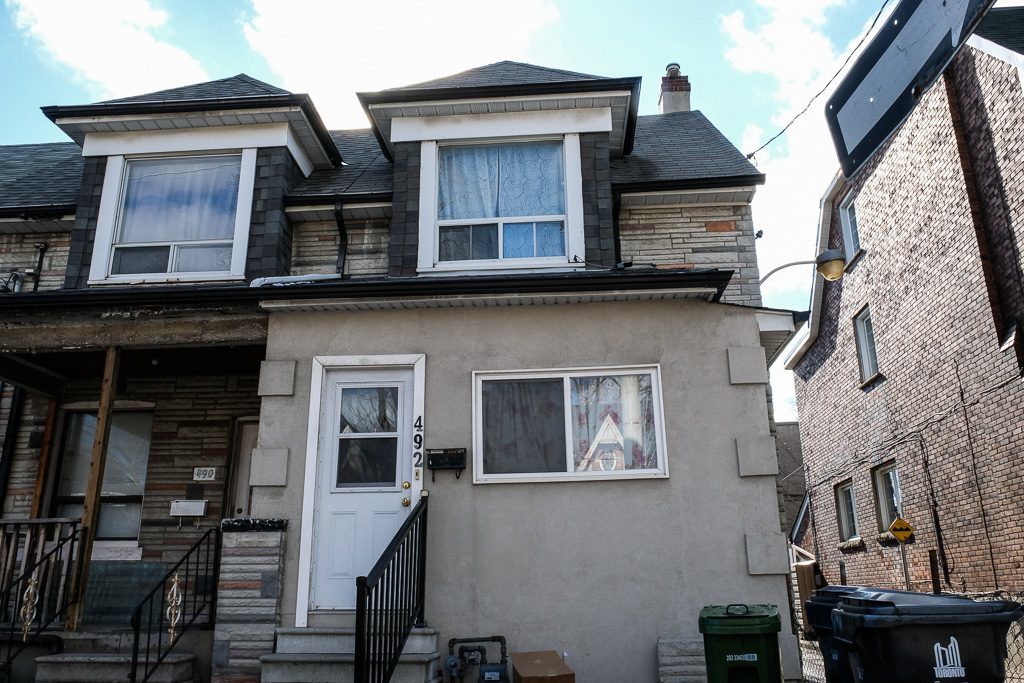
An expensive semi-detached home on 492 Landsdowne Avenue in Dufferin Grove with four bedrooms and three bathrooms listed for $1.29 million. (RSJ/ Will Lofsky) 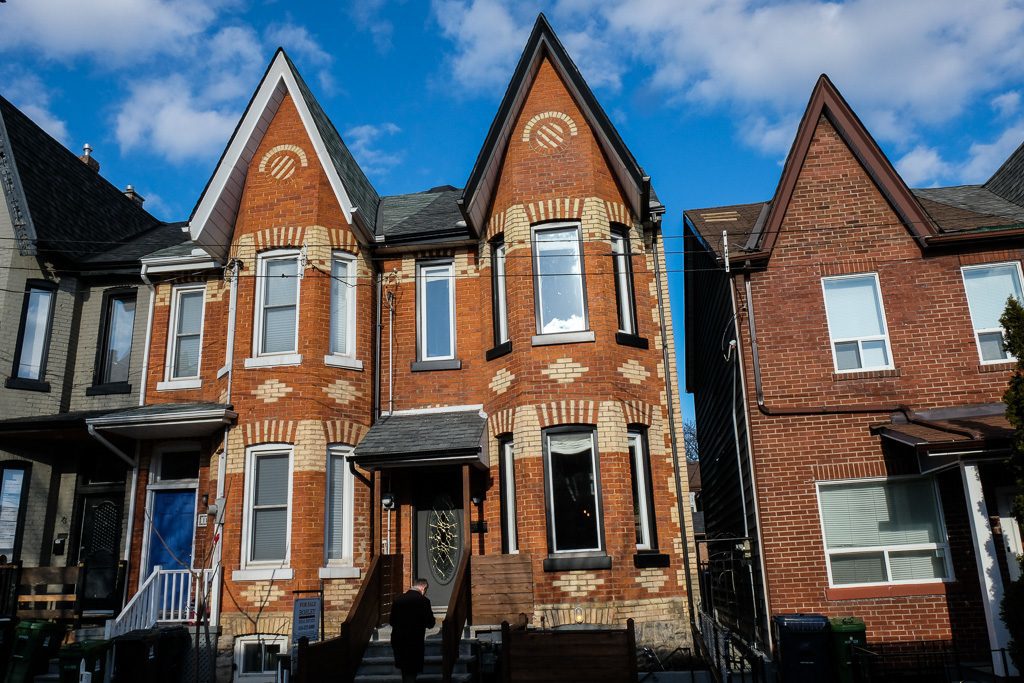
A semi-detached home with three bedrooms and bathrooms on 9 Manning Avenue in Trinity Bellwoods going for $1.2 million. (RSJ/ Will Lofsky) 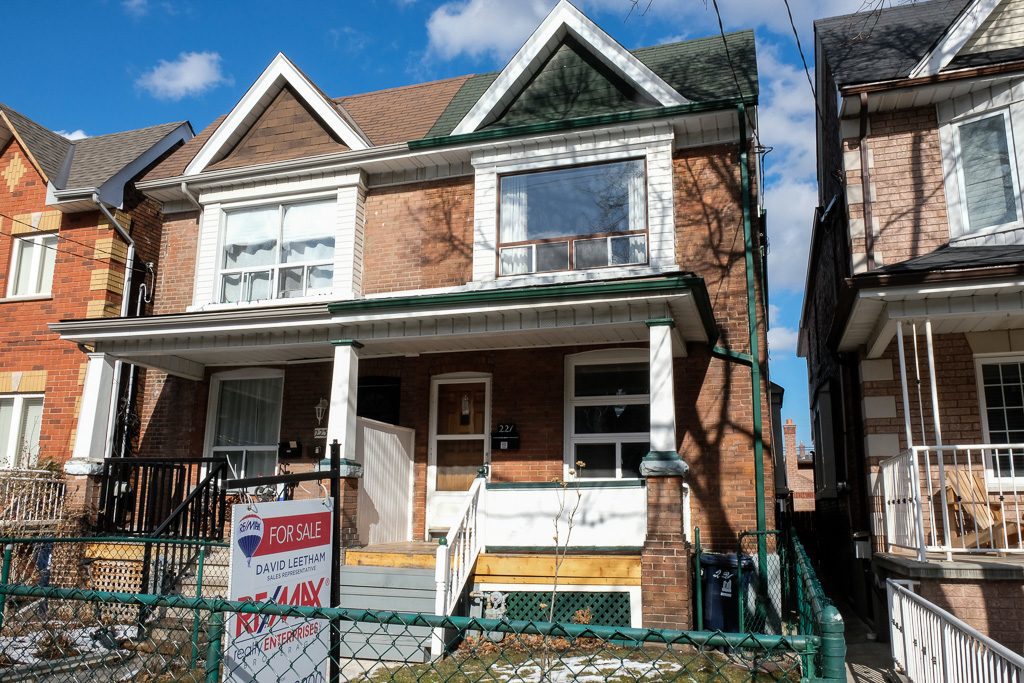
A basic semi-detached home in Dufferin Grove with three bedrooms and two bathrooms on 221 Margueretta Street listed for $899,990. (RSJ/ Will Lofsky) 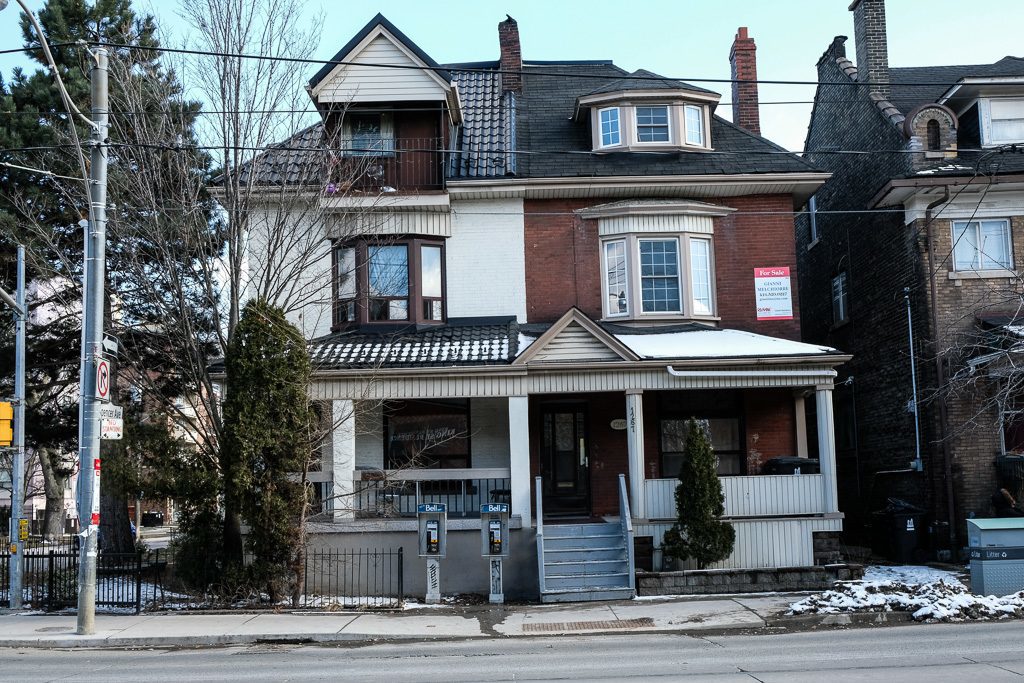
A great deal in Parkdale for a semi-detached home with nine bedrooms and 10 bathrooms on 1267 King St. W. for $1.45 million. (RSJ/ Will Lofsky) 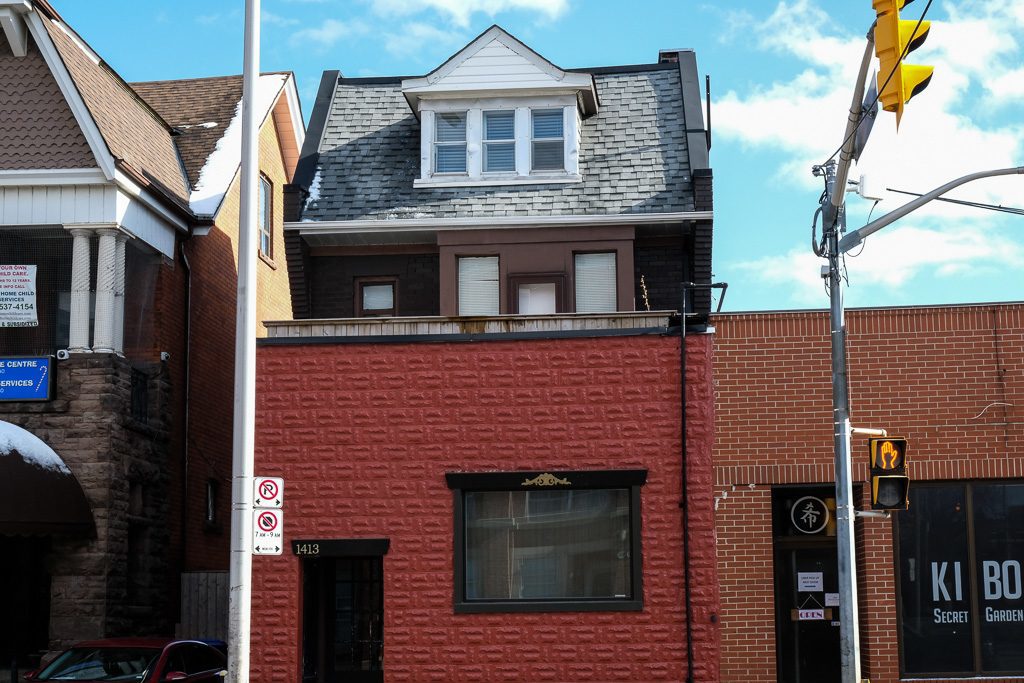
A building on 1413 Bloor St. W. has four self-contained, dismal apartments, and is on the market for $1.29 million. (RSJ/ Will Lofsky)
Much of the local love of the neighbourhood stems from the unique services Dufferin Grove Park offers. There is no park like it, the one place in Toronto you can bring your family to Friday evening suppers, purchase city-baked bread, sign your kids up for arts camps and go to nightly bonfires with upwards of 200 people. The park is walking distance to a shopping mall, subway station, and the Organic Farmer’s Market, which is open every Thursday of the year.
Buyers are certainly not the only ones concerned about housing in Dufferin Grove. While rent is four per cent lower in the community than the Toronto average according to TorontoRentals.com, the price is still unmanageable for middle class families looking to one day own a home. The City of Toronto reports that in 2015 the average middle-class income was $65,289 before tax. If a potential owner’s monthly income is approximately $4,733.45, and they have a mortgage payment of $3,000, a decent living still puts them behind the eight ball.
For families looking to purchase a home in the area, the mortgage payment is only the beginning. Andrew Bolton, a broker at Kelley Williams Realty Centres, says that although there has been “serious appreciation in the past five to 10 years,” untouched homes built before 1960 in the neighbourhood could cost a couple hundred thousand dollars to fix wiring, plumbing, and potentially foundational issues once the walls have been ripped out for gutting.
Considering the possible nightmare when purchasing housing in Dufferin Grove, the average sale in 2019 of $1,307,555 is exponentially higher than the Toronto average in 2019 on MLS of $1,179,098.
As families struggle to find housing, small businesses also struggle to stay afloat.
Tracey TieF, a single mom, and owner of Anarres Natural Health, an in-store and online retailer specializing in organic, natural cosmetics and aromatherapy has been through the wringer.
At her current store, which smells like incense and is so quiet you can hear the minimalistic, meditation soundtracks echoing around the wooden-carved walls, TieF, wearing a multi-coloured outfit straight out of the 60s pours her heart out to me in between helping customers.
Last year, at the original location off of Bloor and Dovercourt, Triovest Realty, a property advisory firm, more than doubled the rent to get her out of the building said TieF. Triovest Realty declined to comment.
“A few months after they took over the building, they sent us a note saying we are proposing your rent will be $4,500 a month plus taxes,” says TieF. The firm has also asked her to vacate the basement, which they said was not part of their rental service or being used. “We had consultation rooms down there that we built, we had storage, we were really using the space.”
The new location at 1076 Bloor Street West is much bigger, and owned by a private landlord, but due to the great location, TieF is now paying $6,000 a month and had to let go of three employees.
She says, she is now working for free and out $50,000, living off of $1,300 a month with two kids in a house in the neighbourhood, “That level of increase has not been something that the business is able to cope with.”
She’s not the only one stressed out about housing. In a dingy, cramped back room, a real estate agent at HomeLife Local Real Estate Ltd., Brokerage, Alberto Arzola Berrueta, clearly worried about dozens of prospective buyers trying to contact him, impatiently takes two minutes out of his day to talk about the Dufferin Grove real estate market.
He says the price of housing in Dufferin Grove has risen approximately 15 percent in the last three years, the same amount of time he has been working there. “The prices [are] very high, the rent is high also,” says Berreuta. “Houses around here [are] very expensive.”
In 2018, the benchmark rate of interest went up three times, from one percent to 1.75, but in 2019, chief economist at TD Bank, Beata Caranci, predicts that interest will rise 2.25 percent.
“The market has been very tough [for] two years, [since] the government [created] the mortgage stress test,” says Berreuta. “Especially for first-time [buyers].”
The Bank of Canada’s five-year mortgage rate has jumped from 5.14 percent to 5.34 percent since May of 2018 as reported by the Globe and Mail. Mortgage stress tests are used to evaluate if buyers can afford monthly payments at higher interest rates, as the cost of housing is exponentially increasing. If a buyer cannot afford to handle the rising cost of interest, they may be turned down.
Through strict stress tests Canadians may have to spend less to find a home, and with housing starts slowing from 173,153 units in February to 206,809 in March according to the Canada Mortgage and Housing Corporation, the economy is looking gloomy.
Although investing in housing can be very profitable, the down payments required to live in Dufferin Grove scare away aspiring home owners. I reach out to Harold Balchand, the couple’s real estate agent, to see why the listing I went to see is no longer online. He says the couple no longer wants to sell it. With a condo like that, and the competition in the area, I don’t know why they wanted to in the first place.
